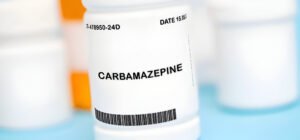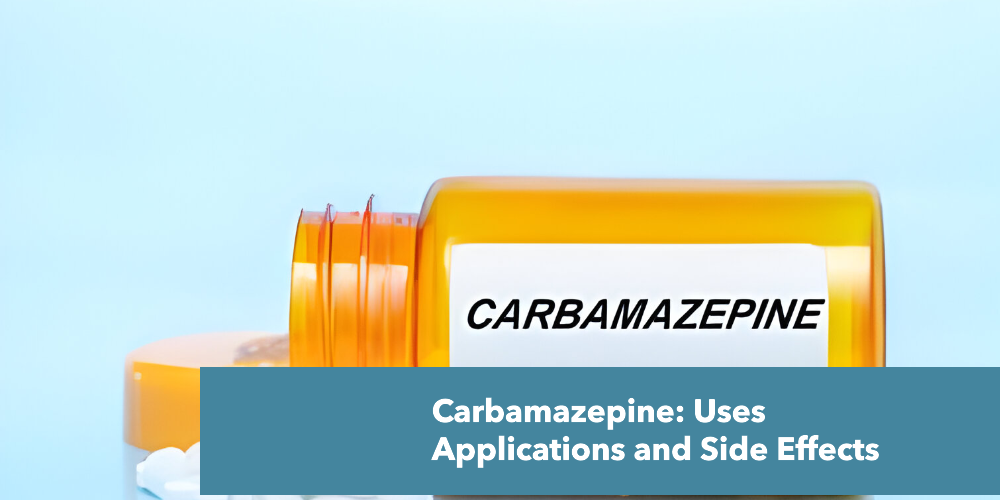What is a Carbamazepine?
Carbamazepine, sold under the brand name Tegral, among others, is an anticonvulsant medication used in the treatment of epilepsy and neuropathic pain. It is also used as a second-line agent in bipolar disorder and as an adjunctive treatment in schizophrenia.
What Class of Drug is Carbamazepine Tablet From?
Carbamazepine belongs to the class of medicines known as dibenzazepine anticonvulsants. It is an anticonvulsant or anti-epileptic drug used to prevent and control seizures.
How Does Carbamazepine Work?
Carbamazepine is an anticonvulsant or anti-epileptic drug that works by reducing abnormal electrical activity in the brain and nerves. It stabilizes electrical activity by slowing down the electrical discharges that cause seizures. Carbamazepine also reduces the release of a neurotransmitter called glutamate, which can cause seizures if present in excess.
In the context of nerve pain, carbamazepine stabilizes electrical signals in the nerves, preventing pain signals from reaching the brain.
While the exact mechanism of carbamazepine in treating bipolar disorder is not fully understood, it is believed to reduce glutamate activity in the brain.
What is Carbamazepine Tablet Used For?

Carbamazepine is a versatile medication primarily used for managing epilepsy and nerve pain, especially in cases of trigeminal neuralgia. It is also effective in treating bipolar disorder, specifically targeting acute manic and mixed episodes in bipolar I disorder.
Beyond these applications, carbamazepine is used in the treatment of various mental health issues. Additionally, it is sometimes prescribed off-label for a range of conditions including depression, anxiety, panic disorders, aggressive behavior associated with schizophrenia, and symptoms related to alcohol withdrawal.
How to Take Carbamazepine Tablet?
You should take carbamazepine tablets exactly as prescribed by your doctor. Be sure to read the medication guide your pharmacist provides and ask your doctor or pharmacist if you have any questions.
You can take carbamazepine with or without food. If you’re using the chewable tablets, chew them thoroughly before swallowing. For the suspension form, shake the bottle well before each dose and use the provided measuring device or a special measuring spoon. Do not use a household spoon as it may not give you the correct dose.
The dosage of carbamazepine will depend on your medical condition and your response to the treatment. Your doctor may start you on a low dose and gradually increase it over several weeks. It’s important to follow your doctor’s instructions carefully and take the medication regularly to get the most benefit. Do not stop taking carbamazepine without consulting your doctor.
Additionally, we recommend avoiding grapefruit or grapefruit juice while taking carbamazepine unless your doctor or pharmacist says it is safe. Grapefruit can increase the chance of side effects.
What is the Recommended Dosage of the Carbamazepine Tablet?
The recommended dosage of carbamazepine depends on the patient’s age and the condition being treated. For adults, the initial dose is typically 200 mg orally twice a day, with weekly increases of up to 200 mg per day until an optimal response is obtained. The maintenance dose for adults is usually in the range of 800 to 1,200 mg per day, with a maximum dose of 1,600 mg per day. However, some patients may require up to 2,000 mg per day or more.
For children and adolescents, the dosage is adjusted based on age:
16 to 17 years old: The initial dose is 200 mg twice a day, with weekly increases of up to 200 mg per day. The maximum dose is 1,200 mg per day.
12 to 15 years old: The initial dose is 200 mg twice a day, with weekly increases of up to 200 mg per day. The maximum dose is 1,000 mg per day.
6 to 11 years old: The initial dose is 100 mg twice a day, with weekly increases of up to 200 mg per day. The maximum dose is typically 1,000 mg per day.
What are the Side Effects of the Carbamazepine Tablet ?
Carbamazepine, like any medication, can cause side effects, but not everyone will experience them. The common side effects of carbamazepine include:
Feeling sleepy, dizzy, or tired
Nausea and vomiting
Headaches
Dry mouth
Skin rash
Blurred vision
Problems with walking and coordination
Increased sensitivity to sunlight
Sexual problems in males
Stomach pain
It is important to note that serious side effects can occur, such as Stevens-Johnson syndrome, toxic epidermal necrolysis, and low blood cell counts. If you experience any unusual or persistent symptoms, it is important to consult your doctor or pharmacist.
What are the Warning and Precautions of Carbamazepine Tablets?

When considering the use of carbamazepine tablets, it’s important to be aware of several warnings and precautions to ensure your safety and maximize the effectiveness of the treatment.
Precautions:
Before starting carbamazepine, you must inform your doctor or pharmacist if you have any allergies, especially to carbamazepine itself, other anti-seizure medications (like fosphenytoin, oxcarbazepine, phenobarbital, phenytoin, primidone), or tricyclic antidepressants (such as amitriptyline, desipramine). Additionally, some forms of this medication may contain inactive ingredients (such as sorbitol in the suspension) that can cause allergic reactions or other problems. Always discuss your full medical history with your healthcare provider, particularly if you have issues like decreased bone marrow function, blood disorders, glaucoma, heart disease, kidney disease, liver disease, mental/mood disorders, or mineral imbalances.
This medication can cause dizziness or drowsiness. As such, you should not drive, use machinery, or perform any tasks that require alertness until you are sure you can do so safely. Alcohol and marijuana (cannabis) can exacerbate these effects, so they should be avoided.
Carbamazepine may also make you more sensitive to the sun. We recommend limiting your time in the sun, avoiding tanning booths and sunlamps, and wearing sunscreen and protective clothing when outdoors. If you experience sunburn or notice skin blisters/redness, seek medical help immediately.
If you have diabetes or a condition that requires you to limit sugar intake, be cautious with chewable tablets or suspension, as these may contain sugar.
Warnings:
Carbamazepine can rarely cause very serious (possibly fatal) skin reactions, particularly within the first few months of treatment. People of Asian/South Asian descent may have a higher risk. Your doctor may perform a blood test to determine your risk before starting treatment. If the test indicates a high risk, your doctor will discuss the risks and benefits of carbamazepine and other treatment options with you. If you develop symptoms like skin rash, blisters, peeling, itching, or swelling, seek medical attention immediately.
Moreover, carbamazepine has been known to rarely cause severe blood disorders such as aplastic anemia or agranulocytosis. Your doctor will monitor your blood counts to minimize the risk of these side effects. It’s crucial to keep all medical and lab appointments. Get medical help right away if you experience signs of infection (such as persistent sore throat, fever, swollen lymph nodes), unusual weakness or tiredness, shortness of breath, or easy bleeding/bruising.
By taking these precautions and being aware of the warnings, you can help ensure a safe and effective treatment with carbamazepine.
How Does Carbamazepine Interact with Other Medicines?
Carbamazepine can interact with a variety of medications, herbal remedies, vitamins, and supplements, so it’s crucial to consult your doctor or pharmacist before combining it with other treatments. Here are some important drug interactions you should be aware of:
Antidepressants: Carbamazepine may interact with certain antidepressants such as amitriptyline, citalopram, mirtazapine, and fluoxetine (Prozac). These interactions can alter the levels of either carbamazepine or the antidepressant in your body, potentially leading to increased side effects or decreased effectiveness.
Hormonal Birth Control: Carbamazepine can reduce the effectiveness of hormonal birth control methods like pills, patches, or rings. This increases the risk of unintended pregnancies and side effects such as breakthrough bleeding.
Antipsychotics: The effectiveness of atypical antipsychotics, such as quetiapine (Seroquel) and aripiprazole (Abilify), may be decreased by carbamazepine, as it can lower their levels in your body.
Blood Thinners: Carbamazepine can affect the efficacy of blood-thinning medications like warfarin, apixaban, and rivaroxaban, potentially increasing the risk of blood clots due to reduced effectiveness of these medications.
Antibiotics and Antifungals: Certain antibiotics and antifungals, such as clarithromycin, erythromycin, fluconazole, and isavuconazonium, may interact with carbamazepine. These interactions can impact how carbamazepine or the other drugs are metabolized.
Painkillers: Strong painkillers such as tramadol, oxycodone, and buprenorphine may become less effective when taken with carbamazepine.
Monoamine Oxidase Inhibitors (MAOIs): It is recommended to avoid taking MAOIs, such as isocarboxazid and phenelzine, with carbamazepine, as they can affect each other even after you’ve stopped taking the MAOIs.
St. John’s Wort: This herbal remedy for depression should not be taken with carbamazepine as it can reduce the effectiveness of the medication.
It’s essential to always inform your healthcare provider about all the medications and supplements you are taking to safely manage potential interactions with carbamazepine
What Happens if I Miss a Dose of Carbamazepine Tablet?
If you miss a dose of carbamazepine, it is important to take it as soon as you remember, unless it is almost time for your next scheduled dose. In this case, skip the missed dose and continue with your regular dosing schedule. Do not take a double dose to make up for the missed one.
It is important to maintain a consistent level of carbamazepine in your system, especially if you are using it to control seizures. Missing doses may trigger a seizure. If you frequently forget to take your medication, setting an alarm or using a medication reminder app can be helpful.
What Happens if I Overdose on Carbamazepine Tablet?
Carbamazepine overdose can have serious and life-threatening consequences, and immediate medical attention is required. The effects of an overdose are dose-dependent and can cause central nervous system (CNS) depression, anticholinergic effects, and cardiac toxicity.
The treatment for carbamazepine overdose may include:
Gastric decontamination, including gastric lavage (stomach pumping) and activated charcoal to prevent further absorption.
Intubation and ventilation to protect the airway and support breathing.
Enhanced elimination techniques such as hemodialysis, hemoperfusion, or hemofiltration to remove carbamazepine from the body.
Treatment of specific symptoms, such as benzodiazepines for seizures and vasopressors for hemodynamic instability.
The prognosis for carbamazepine overdose depends on the severity of the toxicity and the promptness of treatment. In some cases, patients may experience long-term neurological or cardiac complications.
Can Kidney Patients Take Carbamazepine Tablet?
If you have kidney issues and are considering carbamazepine for treatment, it’s important to proceed with caution. Carbamazepine is primarily eliminated by the kidneys, and impaired kidney function can lead to higher levels of the drug in your body, increasing the risk of side effects. Because of this, we recommend starting with lower initial doses of carbamazepine if you have renal impairment.
During treatment, it is crucial to closely monitor your kidney function to ensure that the drug levels and kidney performance remain safe. This monitoring will help manage the dosage appropriately and adjust it as necessary to minimize the risk of adverse effects. Always consult with your healthcare provider to determine the best treatment approach and to discuss any potential risks associated with using carbamazepine given your specific kidney condition.
Can Liver Patients Take Carbamazepine Tablet?
If you have liver conditions and are considering taking carbamazepine, it’s essential to understand the associated risks and precautions. Carbamazepine can cause liver injury, which can be severe and sometimes fatal. The risk of liver injury is particularly higher if you are of Asian descent and carry the HLA-B*1502 gene variant.
Liver damage from carbamazepine often occurs as part of a broader hypersensitivity reaction known as Drug Reaction with Eosinophilia and Systemic Symptoms (DRESS). This condition can manifest with several symptoms including fever, skin rashes, vasculitis, lymphadenopathy (which can mimic lymphoma), arthralgia (joint pain), leucopenia (low white blood cell count), eosinophilia, and abnormal liver function tests.
Additional signs of carbamazepine-induced liver injury that you should watch for include:
Nausea and vomiting
Loss of appetite
Fatigue
Jaundice (yellowing of the skin or eyes)
Dark urine
Pain on the right side of the abdomen
Itching
Clay-colored stools
Mild fever
Can Blood Pressure Patients Take Carbamazepine Tablet?
If you have high blood pressure and are considering taking carbamazepine, it’s important to approach this treatment with caution. While carbamazepine can be used by people with hypertension, there are significant considerations to keep in mind.
Carbamazepine has been linked to an increase in blood pressure, even at low doses and within therapeutic levels. Additionally, it may interfere with the effectiveness of antihypertensive medications, potentially leading to refractory hypertension, where blood pressure remains high despite treatment.



